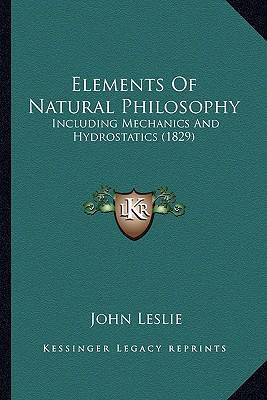
- Retrait gratuit dans votre magasin Club
- 7.000.000 titres dans notre catalogue
- Payer en toute sécurité
- Toujours un magasin près de chez vous
- Retrait gratuit dans votre magasin Club
- 7.000.0000 titres dans notre catalogue
- Payer en toute sécurité
- Toujours un magasin près de chez vous
Elements Of Natural Philosophy
Including Mechanics And Hydrostatics (1829)
John Leslie
Livre broché | Anglais
59,95 €
+ 119 points
Description
Elements of Natural Philosophy: Including Mechanics and Hydrostatics (1829) by John Leslie is a comprehensive textbook on the fundamental principles of natural philosophy. The book covers a wide range of topics, including mechanics, hydrostatics, optics, and astronomy. The author presents the material in a clear and concise manner, making it accessible to students and readers of all levels.The book begins with an introduction to the principles of natural philosophy, including the laws of motion, force, and energy. The author then moves on to mechanics, covering topics such as velocity, acceleration, and momentum. He also discusses the principles of hydrostatics, including the properties of fluids and the laws of buoyancy.The book also includes a section on optics, covering topics such as light, reflection, and refraction. The author explains the principles of astronomy, including the motions of the planets and the phases of the moon. The book concludes with a discussion of the principles of heat and electricity.Throughout the book, the author includes numerous examples and illustrations to help readers understand the material. He also includes exercises at the end of each chapter to allow readers to test their understanding of the material.Overall, Elements of Natural Philosophy: Including Mechanics and Hydrostatics (1829) is a valuable resource for students and readers interested in the fundamental principles of natural philosophy. The book provides a clear and concise overview of the subject, making it accessible to readers of all levels.This scarce antiquarian book is a facsimile reprint of the old original and may contain some imperfections such as library marks and notations. Because we believe this work is culturally important, we have made it available as part of our commitment for protecting, preserving, and promoting the world's literature in affordable, high quality, modern editions, that are true to their original work.
Spécifications
Parties prenantes
- Auteur(s) :
- Editeur:
Contenu
- Nombre de pages :
- 550
- Langue:
- Anglais
Caractéristiques
- EAN:
- 9781164205241
- Date de parution :
- 10-09-10
- Format:
- Livre broché
- Format numérique:
- Trade paperback (VS)
- Dimensions :
- 152 mm x 229 mm
- Poids :
- 725 g

Les avis
Nous publions uniquement les avis qui respectent les conditions requises. Consultez nos conditions pour les avis.






